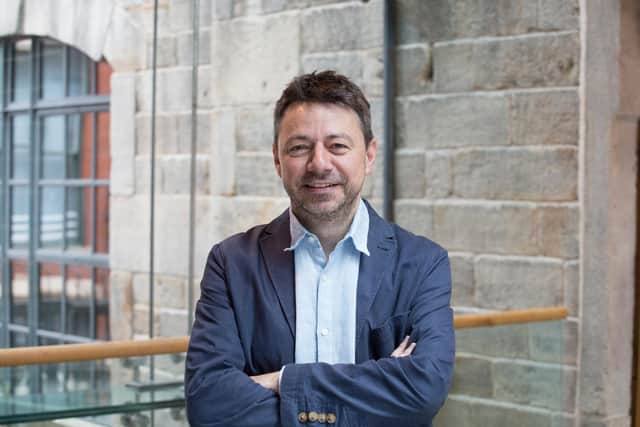How Civic Engineers is building the communities of the future
Whilst the 2008 market slump created years of challenges for many people in the construction and building industry, for Julian Broster and Stephen O’Malley it gave them the chance to stand back, take stock, and look to the future.
And that reflection led to the creation of Civic Engineers which has developed into one of the UK’s leading engineering consultancies, with offices in Leeds, Manchester, London, and Glasgow.
Advertisement
Hide AdAdvertisement
Hide AdJulian said: “There’s no doubt that in our industry the years 2008 to 2012 can’t be described as anything but horrendous. Companies were closing all around us and major infrastructure projects ground to a halt.


“For Stephen and me though, this provided us with an opportunity to set up a new practice. Between us we had more than 50 years’ industry experience and were working for a company called Martin Stockley Associates which had offices in Manchester and London.”
He continues: “We continually saw things around us which we believed were holding back our profession. The main one was what can only be described as ‘silo’ working – teams placing distinct barriers between civil engineers, structural engineers, and other industry professionals.
“We wanted to break down these barriers to bring together teams of talented engineers and develop a holistic, people-centred and climate-sensitive approach to complex challenges.”
Advertisement
Hide AdAdvertisement
Hide AdCivic Engineers started in 2013 with studios in Manchester and London. The Leeds studio opened in 2016 with Glasgow opening just 12 months later.
Julian says: “From the beginning we wanted to move from a multidisciplinary way of working to interdisciplinary.
“This cross-fertilisation of disciplines, blending high-quality building design and the transformation of urban infrastructure and public space has helped us break down the siloes which were all too common.
“Our approach represents a return to the original values of engineering, which over the years had become splintered into specialisms.” He continues: “As structural, civil and transport engineers, we aim to create inspirational structures and places that have a positive impact on the environment and enable people to lead happier and healthier lives.
Advertisement
Hide AdAdvertisement
Hide Ad“In achieving this vision, we as a practice, alongside our industry, profession, and society as a whole, have a moral obligation to act urgently to repair the damage that our current lifestyles have done to the planet and increase our efforts in response to the climate and biodiversity emergency.
“Climate sensitivity and its protection has been a founding feature of our practice, since its inception and it’s embedded in our vision, our values, and our
designs.
“We’ve pursued a sustainable design agenda and recognise that as engineers we have the opportunity to make a real and substantial impact on the carbon cost of the built environment through carefully considered design, well-informed decision-making and the pursuit of nature-based solutions.”
One of the company’s current flagship projects is working with Leeds City Council on its Leeds Our Spaces Strategy which sets out a “vision for the creation of vibrant, inclusive, world class city centre public realm.”
Advertisement
Hide AdAdvertisement
Hide AdThe strategy seeks to stitch together the existing city centre with the extensive development proposed to the south of the city as part of the South Bank Leeds Regeneration Framework and the Integrated Station Masterplan.
Civic Engineers has identified areas where surface water might be better managed using Sustainable Urban Drainage Systems (SuDS), particularly relevant in the city after the Boxing Day floods in 2015.
The company has also considered ways of consolidating bus stops and reducing carriageway widths to make better use of the spaces between buildings, especially in areas where general traffic has been restricted and most users are now pedestrians.
Alongside Re-form landscape architects, Civic Engineers has developed a series of high-level strategies to develop spaces and streets around the city.
Advertisement
Hide AdAdvertisement
Hide AdAs funding comes forward for the various transport schemes and development proposals, these principles will feed into the detailed designs, making sure that the public realm works as hard as possible to facilitate movement, biodiversity, and amenity, contributing to the socio-economic success of the growing city.
Julian explains: “We’ve introduced initiatives such as a Green Warrior group who are responsible for coordinating our efforts to improve our green credentials in each of our studios. We encourage staff to walk, cycle or use public transport for their commutes to work and don’t have a fleet of vehicles.
“We positively try to reduce the amount of travel required for meetings by making effective use of Skype and other forms of video conferencing.
“All our 4 Studios are purposely located in easy access to a train/tube or metro station and have facilities to store bikes and showers to use after a cycle ride to work.
Advertisement
Hide AdAdvertisement
Hide Ad“We’ve also signed up for a Green Energy Audit to look at ways in which we can reduce our energy consumption in each of the studios.
“Recycling is an easy way that individuals and teams can make a difference to improve our environmental credentials. Each of the studios offer recycling facilities for food, plastic, cardboard, and paper; and we widely encourage employees to recycle their waste.
“We’ve also committed to reduce the usage of non-disposable cups and actively encourage employees to use reusable cups instead. Additionally, we also recycle defunct electrical items and printer cartridges.”
So, what does Julian believe the future holds for the industry?
Advertisement
Hide AdAdvertisement
Hide AdHe concludes: “We’re living through an age of disruption, driven by new technologies, business models, disease epidemics and the global crisis of climate change.
“In a future where engineers play a bigger role in society, it won’t be just the fabric of the built environment that occupies our attention, we’ll be equally concerned about the fabric of communities and the shared culture that holds them together.